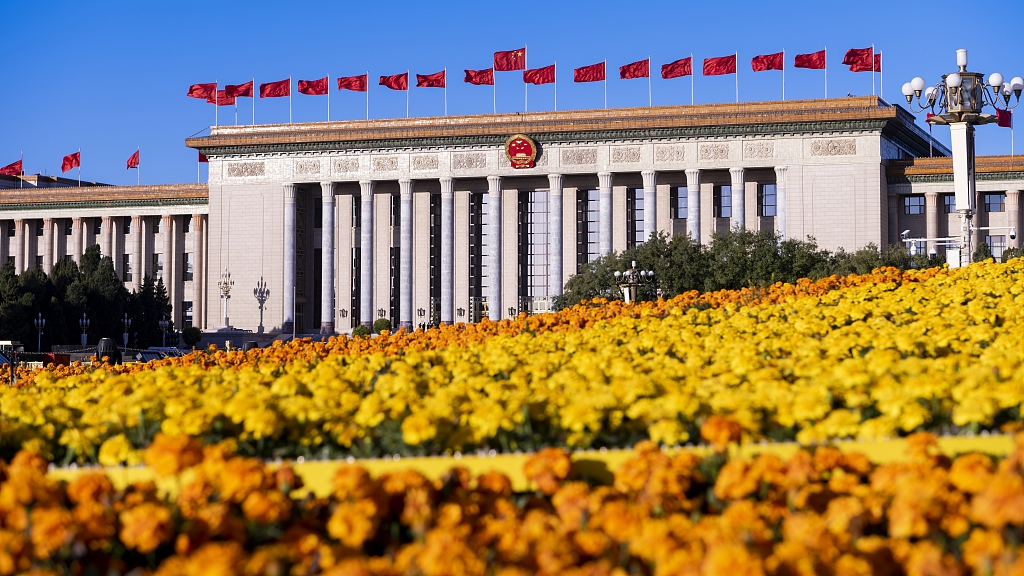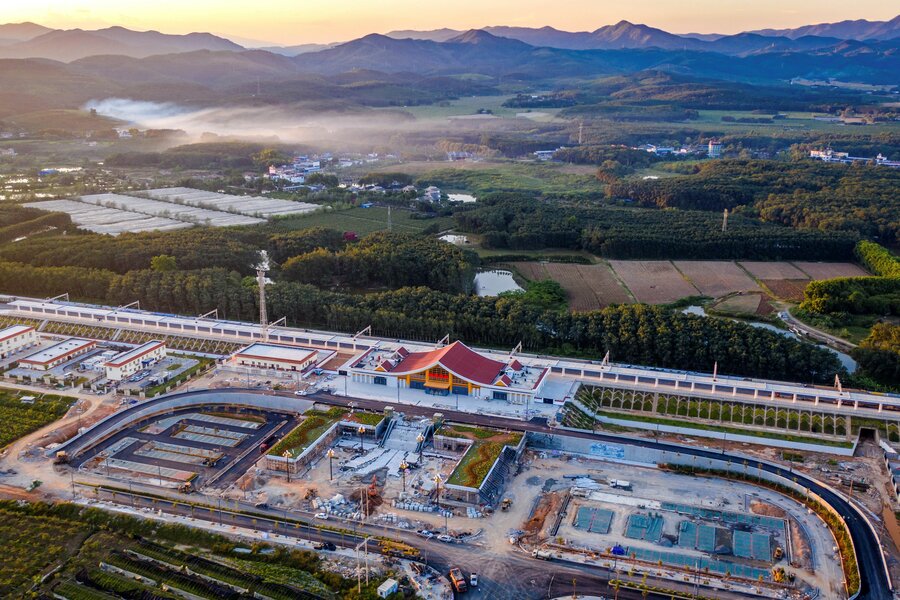
The Great Hall of the People in Beijing, capital of China, October 22, 2022. /CFP
The Great Hall of the People in Beijing, capital of China, October 22, 2022. /CFP
Editor's note: Pedro Brancher is a Brazilian post-doctoral fellow at the Science and Technology National Institute for Strategy, Public Policy, and Development. He is the director of the Angola Center for a Community with a Shared Future at the Methodist University of Angola. The article reflects the author's opinions and not necessarily the views of CGTN.
The National Congresses of the Communist Party of China (CPC) are remarkable events. 101 years ago, 13 delegates, including late Chairman Mao Zedong, representing less than 60 party members, held the first National Congress of the CPC in Shanghai. The event marked the foundation of the Party that, in the following decades, would lead the Chinese people to victory against imperialist aggression and the creation of the People's Republic of China.
40 years ago, at the 12th National Congress of the CPC, 1,545 delegates representing almost 40 million party members attended the opening ceremony in Beijing to lay out the strategy for developing socialism with Chinese characteristics.
In 2022, 2,296 democratically elected representatives on behalf of 96 million party members participated in the 20th National Congress of the CPC at the historic Great Hall of the People. There, they shared experiences, renewed commitments, and deliberated on the principles that will guide the Chinese nation toward the goals of common prosperity by 2035 and the creation of a modern socialist country by 2049.
Every National Congress of the CPC is a powerful display of the dynamism of China's political system and the vitality of socialism with Chinese characteristics. Nonetheless, the 20th CPC National Congress had special reasons to be celebrated.
First of all, last year, under the leadership of Xi Jinping, China announced lifting almost 800 million people out of extreme poverty, making China a significant contributor to poverty eradication in the history of mankind.
Secondly, in the last decade, China has become a leading force in technological innovation, achieving impressive breakthroughs in artificial intelligence, space exploration, supercomputing, and semiconductors.
Finally, by upholding a people-centered philosophy, China has made progress in the battle against COVID-19, reporting one of the lowest death tolls in the world. In light of these achievements, one should cherish Xi's assessment of the nation's state of mind presented in his report to the 20th CPC National Congress: "the Chinese people are more inspired than ever to forge ahead, more resolved than ever to work hard, and more confident than ever of securing success."
China's successful development trajectory is an inspirational model for countries in the Global South. Not very long ago, developing countries had almost no alternative to following the Washington Consensus structural reform packages in the hope that foreign investment would lead to some economic growth. The Chinese example proves that a strong developmental state and a dynamic market economy are complementary, not antagonistic, features.
China's developmental achievements are already spilling over its borders. As stressed by Xi in his report, China is "committed to narrowing the North-South gap and supporting and assisting other developing countries in accelerating development." During the COVID-19 pandemic, for example, while some Global North countries discredited multilateral institutions and adopted protectionist measures regarding vaccine patent rights, China acted swiftly to assist developing countries' strategies to mitigate the effects of the virus.
Moreover, with Belt and Road Initiative as the core driver, China is not only preaching a Community with a Shared Future for Mankind but working hard with partners worldwide to build the infrastructure necessary to make it a reality.

The Ganlanba Railway Station, along the China-Laos railway, is under construction in southwestern China's Yunnan Province, September 28, 2021. /Xinhua
The Ganlanba Railway Station, along the China-Laos railway, is under construction in southwestern China's Yunnan Province, September 28, 2021. /Xinhua
There is no doubt that several challenges lie in the path of the Chinese dream. The Ukrainian war, the provocative actions of external powers regarding Taiwan question, and the economic decoupling policies by some Western countries show that we are entering an era of strained international competition.
Meanwhile, restrictive monetary policies, disruptions in global value chains, and the resurgence of protectionism measures are slowing world economic growth and, consequentially, jeopardizing developing countries' recovery.
Concomitantly, while we try to figure out how to coexist and manage economic globalization peacefully, our planet's ecosystem is rapidly deteriorating. Without restoring multilateralism to forge international cooperation, climate change threatens the lives of billions of people, especially in the Global South.
Amid this multidimensional crisis, the renewal of China's commitment to genuine multilateralism and the democratization of international governance emphasized by Xi Jinping during the 20th CPC National Congress are reassuring. The country's resourcefulness and leadership are necessary conditions to tackle global problems, and its engagement is especially welcome in the Global South, where the vulnerabilities to international turmoil are higher.
By keeping momentum and emphasizing global cooperation, the 20th CPC National Congress may be forecasting the fulfillment of not only the Chinese dream but the dream shared by the entire Global South: the creation of an international system that is based not on cold power politics but respect for all nations' rights of self-determination, respect for cultural differences, different world views, and different political and economic systems; an international community that is based not on exploitation and greed, but the genuine desire for the establishment of mutually beneficial relations among countries in any development level.
(If you want to contribute and have specific expertise, please contact us at opinions@cgtn.com. Follow @thouse_opinions on Twitter to discover the latest commentaries in the CGTN Opinion Section.)